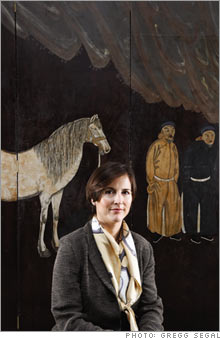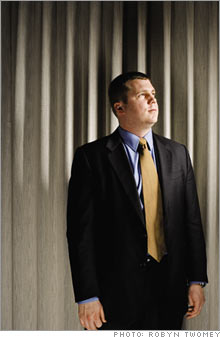Scared of another selloff? Go globalDespite volatility, world markets offer enticing opportunities. Fortune's Katie Benner asked four top fund managers for their best picks.(Fortune Magazine) -- Foreign stocks? Are you kidding? Not at all. Even though the markets are bumpy today, global stocks have outperformed U.S. equities since 2002, with the MSCI EAFE index, a widely followed foreign stock benchmark, delivering an average annual five-year return of 15 percent, vs. 6.2 percent for the S&P 500 (through Dec. 31). And the recent worldwide selloff hasn't dimmed optimism. While many markets saw declines of 3 percent or more in late February - and some strategists foresee more volatility ahead - few observers were surprised by the slide.
"It's healthy to have a correction, because markets should not go up in a straight line," says Juliet Cohn, a manager at Principal Funds. Many market watchers, including Cohn, say the U.S. will continue to underperform the rest of the world. Among the trends that she and others say support continued strength overseas are the global capital glut and the weak dollar. Emerging markets are still attractive to many fund managers because of improving fundamentals and low inflation rates. To uncover fresh opportunities abroad, we asked four top foreign mutual fund managers for their best ideas. (Unless noted, all stocks trade as ADRs on U.S. exchanges. You can buy stocks on foreign exchanges through some major brokerages, including Merrill Lynch, and discounters such as Charles Schwab.) Sarah Ketterer is CEO of Causeway Capital Management, where she pilots the International Value fund (CIVVX), up 18.6 percent for the five years through Dec. 31, vs. 15 percent for the EAFE. She is a classic value manager who has been focusing on unloved large-cap stocks. "We look for free or surplus cash. Managements have recognized that they need to return that cash to shareholders," says Ketterer. "I'll take that over earnings upgrades and momentum." Ketterer says that the telephone equipment company Ericsson (Charts) has great global market share; 40 percent of all calls worldwide are placed through an Ericsson system. It has been a poor performer in the past 12 months, gaining only 5 percent as investors worried about a slowdown in telco. But she likes the numbers. "Ericsson generates a 25 percent return on equity," she says. "They have superior financial strength compared with their peers." Another out-of-favor stock she likes is Sanofi-Aventis (Charts).The French pharmaceutical company has a 5 percent global market share in drugs, she says, and it could generate about $65 billion in surplus cash over the next five years. The stock has suffered because the company has delayed the introduction of several new drugs. But now it's priced as though the company will never launch another product. "Nobody believes in the pipeline, and they haven't been able to explain their delays well," says Ketterer. To her, that means the stock has nowhere to go but up. Rudolph Riad Younes, head of international equity at Julius Baer, helps run the International Equity fund (BJBIX), up 21.8 percent over the past five years, and the recently launched International Equity II (JETAX), up 28.6 percent in 2006, vs. 26.3 percent for the EAFE. Younes is a long-term investor who looks for good stocks of all sizes. He also seeks a balance between growth and value. "The only way to avoid being caught at the top when international stocks have already had such great gains is to diversify," he says. Younes sees the Indian banking sector as attractive and cheap. "The market is concentrating on short-term issues like rising interest rates," he says. "But looking long term, this is the time to buy many of these banks." One top choice is ICICI Bank (Charts). With assets of $60 billion and 670 branches, it is the second-largest bank in the country and it's rapidly gaining market share in assets and deposits. Juliet Cohn's Diversified International Equity fund (PINRX), is up 18.4 percent over the past five years. She has been bullish on small- and mid-cap companies, which have been outperforming big caps. But her main focus is finding companies of any size "undergoing positive change." Two of her current favorites are large caps. The Swiss pharmaceutical giant Roche (ROG on the Swiss exchange) has been improving its profit margins thanks to higher-priced products, including oncology drugs. Much of the company's recent success stems from its 56 percent stake in biotech firm Genentech (Charts). "In a sense, Genentech makes Roche a growth company," she says. Cohn praises Nintendo (which trades in Tokyo, with the ticker 7974, $266) for its Wii Console launch. Demand is so great, she says, that there are still shortages in the U.S. and Europe. But what she really likes is that Nintendo continues to dominate the fast-growing portable-game market with its Game Boy franchise. "Given how much China's markets have gone up in 2006, a selloff was no surprise," says Andrew Foster, director of research at Matthews Asian Funds and co-portfolio manager of Matthews Asian Growth & Income (MACSX), up 21.2 percent over the past five years. He likes dividend-paying companies because the regular cash payouts dampen some of the risk that comes with investing in volatile Asian markets. His favorite stock is Taiwan Semiconductor (Charts), which boasts a 4.2 percent yield. "Growth has decelerated relative to its history," he says. "But it has excess capital on the balance sheet, it is still growing, and it's solidly positioned in global markets." He also recommends HSBC (Charts), the globally diversified financial services giant, which yields 4.9 percent. "It is suffering from its exposure to the U.S. subprime mortgage market, but it's trading at a reasonable valuation, provided you don't believe the market is going to fall apart," Foster says. He also thinks the dividend is rock-solid and has the potential to grow over time. Still he warns, "volatility is par for the course in emerging markets." ___________________ |
Sponsors
|


